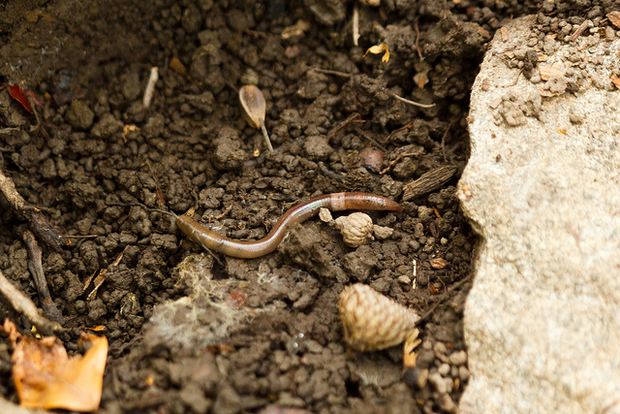First discovered in the Midwest in 2013, the “Asian Jumping Worm” also known as Amynthas agrestis, is an invasive species 4″-8″ long, very fast and can detach its tail.
Worms are found in the top few inches of soil, leaves, or mulches. They are replacing Earthworms, centipedes and other animals. They also damage the roots of plants, deplete nutrients and alter the water retention capacity of the soil. Plants are susceptible to pests, droughts and diseases. Worms are dangerous for agriculture, gardens and forests..
University of Illinois says Worms cannot survive the frigid winters of the Upper Midwest. However, they have an egg casing that lasts throughout the cold weather.
Composting ads boast that the worm can eat and process more than its body weight in organic matter (vegetable scraps, leaves, lawn trimmings, etc.) each day. That same tenacious appetite means that when people release their bait (or their bait escapes) and the worms make their way to the forest, they consume massive amounts of leaf litter. If you were a leaf-litter-feeder such as a millipede, fly larvae, or springtail, this would be a big problem because your food source would be gone! It would also be bad if you were a creature that ate these invertebrates, if you were a salamander or wildflower tuber that lived in the organic layer of the soil. In some areas on the western side of the Smokies, the Jumping Worm population is so high there is almost no leaf litter left. Without this food, native animals are disappearing, and the nutrients from decaying plants aren’t there to build new soil!(SOURCE)
Asian jumping worms are smooth, glossy gray or brown and 1.5 to 8 inches long. They are relatively easy to identify if you take a look at their clitellum (the band around the body of a worm). The clitellum on a jumping worm is milky white to gray-colored, smooth and completely encircles the body of the worm.
If you see these worms, put in a baggie and place in the sun for 10 minutes, or soak in isopropyl alcohol and let your local co-op know.



























